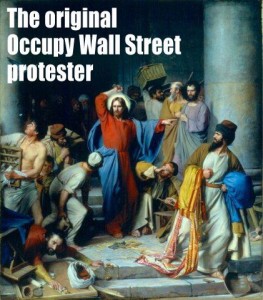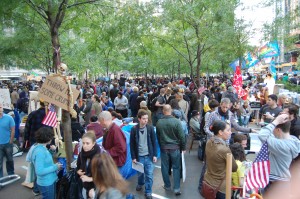Faith and Politics
As I read the blogs and watch the news about what's happening in New York and around the country, I can't help but wonder: If Jesus were walking the streets of New York today, would he be a rabble-rouser activist like he was at the temple, or would he walk up to the CEO of Goldman Sachs and give him a hug?
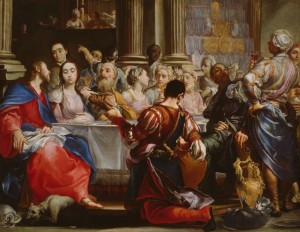
Because this week -- months after the Arab Spring, and after weeks of the growing Wall Street Occupation -- well, in this climate of discontent and dissent as we all begin to wake from our consumer induced coma to see how multi-national corporations control so much more than we can imagine, in a season when tyrants are being over thrown, I simply could not preach a sermon in which I say that God is like an angry murderous slave owning king. Maybe there is a way of finding good news in that but I just couldn't do it.
Occupy Writers; Wild Turkey Chases Camerawoman; Mars Hill Plays the Name Game; Knitting Sweaters For Penguins; Essays on Faith and Life; Music Interviews and News.
Week end's latest news as well as a few pieces you might have missed from the past few days. Check back on Sunday for a review of "The Mighty Macs," a few longer essays from SoJo staff and friends, and the latest news on the U.S. troop withdrawal from Iraq after nine years of war.
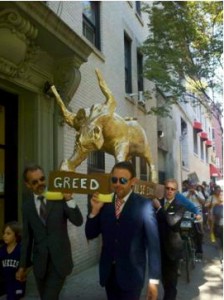 Editor’s Note: In light of the recent protests at #OccupyWallStreet and around the world, we have revisited Jim Wallis’ 2010 book Rediscovering Values: On Wall Street, Main Street, and Your Street and picked out some passages that are particularly pertinent to what we are seeing in our nation today.
Editor’s Note: In light of the recent protests at #OccupyWallStreet and around the world, we have revisited Jim Wallis’ 2010 book Rediscovering Values: On Wall Street, Main Street, and Your Street and picked out some passages that are particularly pertinent to what we are seeing in our nation today.
The Passover of the Jews was near, and Jesus went up to Jerusalem. In the temple he found people selling cattle, sheep, and doves, and the money changers seated at their tables. Making a whip of cords, he drove all of them out of the temple, both the sheep and the cattle. He also poured out the coins of the money changers and overturned their tables. He told those who were selling the doves, “Take these things out of here! Stop making my Father’s house a marketplace!” His disciples remembered that it was written, “Zeal for your house will consume me.”
– John 2:13-17
Interestingly, in his turning over of tables, Jesus specifically targeted the merchants who were selling doves. Doves were the least expensive sacrifice permitted to be offered in the temple, and, therefore, were often bought by the poorest of the pilgrims.
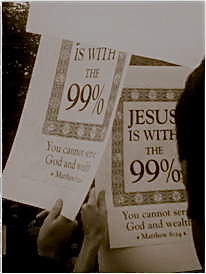
[When Jesus turns over the tables] we see a man enraged at injustice and passionately confronting those who exploit the poor. We also learn that there are some things that we all should get angry about, that there are situations where the only appropriate response is confrontation…
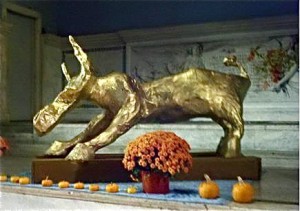 First, we were sold a lie. We were sold an illusion that promised the American Dream was as close as our next purchase. That we could pursue our selfish interests without thought to the consequences, because the “invisible hand” would work it all out in the end. We were told that we did not need to work for wealth, that it would come if only we put our money in the hands of the right stock broker, mutual fund, or stock…
First, we were sold a lie. We were sold an illusion that promised the American Dream was as close as our next purchase. That we could pursue our selfish interests without thought to the consequences, because the “invisible hand” would work it all out in the end. We were told that we did not need to work for wealth, that it would come if only we put our money in the hands of the right stock broker, mutual fund, or stock…
Second, the rules of the game failed. It was supposed to be simple. Work hard, get ahead, buy a home, and tuck some money away for the future in a 401(k). If you followed those rules, everything would work in your favor. But good jobs have disappeared, wages have been garnished, and 401(k) savings have disappeared. The rules of the game seem to have worked for those who set the rules, but not for those who played by them.
Third, our good was supposed to trickle down. We were promised that as the rich got richer, the rest of the country would prosper as well. If we handed our finances and ultimately our lives over to those who knew the market the best, it would benefit us all. If we took the virtues of the market and made them the virtues of our lives, we, too, would experience boundless prosperity. Fulfillment would come if we could just trust the market enough to work for us…
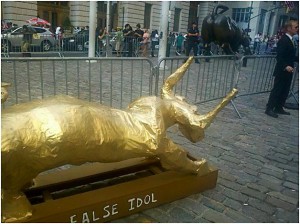 The market has become our “golden calf,” our idol of ultimate allegiance… This is when God—and then Moses—got angry. Why? Just because they built a golden calf? No. The calf could have been just a work of art, a statue to enjoy. What made the calf an idol was that the people gave the newly created calf the credit for leading them out of Egypt. They gave to the golden calf credit and attributes that belong only to God…
The market has become our “golden calf,” our idol of ultimate allegiance… This is when God—and then Moses—got angry. Why? Just because they built a golden calf? No. The calf could have been just a work of art, a statue to enjoy. What made the calf an idol was that the people gave the newly created calf the credit for leading them out of Egypt. They gave to the golden calf credit and attributes that belong only to God…
Today, instead of statues, we have hedge funds, mortgage- backed securities, 401(k)s, and mutual funds. We place blind faith in the hope that the stock indexes will just keep rising and real estate prices keep climbing. Market mechanisms were supposed to distribute risk so well that those who were reckless would never see the consequences of their actions. Trust, security, and hope in the future were all as close to us as the nearest financial planner’s office. Life and the world around us could all be explained with just the right market lens. These idols were supposed to make us happy and secure and provide for all our needs. Those who manage them became the leaders to whom we looked, not just for financial leadership, but direction for our entire lives. That is idolatry.
Rich and poor alike were sucked into making heroes out of those who seemed to be able to turn everything they touched into gold. Holocaust survivor and Nobel Peace Prize recipient Elie Wiesel lost virtually all of his personal wealth and his foundation’s, up to $37 million, to Bernie Madoffs Ponzi scheme. “We gave him everything, we thought he was God, we trusted everything in his hands.”‘
(All pictures are courtesy of Catholics United, who produced the ‘golden calf’. Extracts come from pages 19-29 of the hardcover edition of Rediscovering Values.)
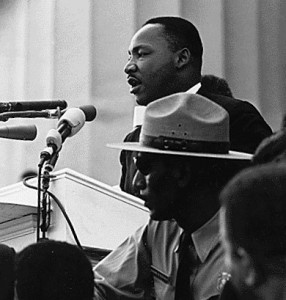 At the dedication ceremony for the Martin Luther King, Jr. Memorial, at least two speakers -- the Rev. Bernice King, Martin Luther King's daughter, and the Rev. Jesse Jackson, one of King's lieutenants -- reminded us that at the end of King's life he was planning the Poor People's March
At the dedication ceremony for the Martin Luther King, Jr. Memorial, at least two speakers -- the Rev. Bernice King, Martin Luther King's daughter, and the Rev. Jesse Jackson, one of King's lieutenants -- reminded us that at the end of King's life he was planning the Poor People's March
The Poor People's March is an ancestor to the current Occupy Wall Street movement that we see breaking out across the globe today. The idea was to bring poor people from across the color line -- white, black, brown, red, yellow -- to Washington to call attention to the importance of economic justice. King understood that economic justice -- distributive justice -- was not a matter of race in the United States.
It was true then, and it is true now that African Americans and Latino/as suffer disproportionately from income inequality. But it is important to remember that people of all colors suffer from the corrosive effects of income inequality. Some of the poorest communities in the country are European American. The poorest states in the United States with some of the worse educational and health care outcomes are states in the former confederacy.
Income inequality has increased since 1968. So the question that insists upon being answer is this: Why has income inequality worsened between 1968 and today?
Interfaith Worker Justice has published a Prayer Service designed to help people reflect on a moral economy within the context of their religious tradition. Written for clergy and religious leaders, the prayer service is aimed for those Occupying Wall Street and other cities, and for congregational use.

As Christians are we not obligated to help those who area most in need? Should we only focus on those in our own country who need our help, or does God's command us to ignore borders?
How might the words of the biblical prophet Isaiah resonate with us today, when he says: "If you spend yourselves on behalf of the hungry and satisfy the needs of the oppressed, then your light will rise in the darkness, and your night will become like the noonday."
As you are reading this, the Congressional Joint Select Committee on Deficit Reduction (a.k.a. The Super Committee) is making choices about who and what our nation will protect.
Will we protect the wealthiest 2 percent by preserving $690 billion in Bush era tax cuts?
Or will we protect children by preserving $650 billion in special education, student aid, and assistance to low-income schools?
Will we protect corporations by preserving $97.5 billion in subsidies for big business or will we protect families by preserving $98 billion in Head Start and child care programs?
We have 32 days left to remind Congress that, "Oppressing the poor in order to enrich oneself, and giving to the rich, will lead only to loss" (Proverbs 22:16).
The Side Effects Of Fast-Tracking Deportations; Ten Percent Of All Major Mainstream Media News Was About Occupy Wall Street Last Week; Mexican Clown Convention Holds 'Laugh For Peace'; What Has Obama Done For Poor People?; Class Warfare In The Senate Race; Restorative Justice And The Economy Of Grace; Pastors Hope For A Louder, Unrestricted Voice In 2012 Election; Jesus At Occupy Wall Street: 'I Feel Like I've Been Here Before'
Moammar Gadhafi Reported Killed; Obama To Court Religious Voters In 2012;The Tragic Costs of Immigration Detention;The 'Gospel' According To Herman Cain; Republican Environmental Group Seeks To Put Conservation Back On The Conservative Agenda; Cain Claims 999 Has A Secret Fix To Help The Poor: 'I Just Haven't Told The Public Or My Opponents About It Yet'
Controversy at the World Scrabble Championships, President Obama's teleprompter was stolen, 40 signs of the times, the debut of "The Walken Dead," R.E.M. releases final song, unlikely Occupy Wall Street supporters, Walker Percy, and more!
The high cost of anti-immigration laws. Why candidates' faith matters. ABC News' exclusive interview with President Obama. U.S. Hispanics choosing churches outside Catholicism. Three U.S. Congressmen tour the Canadian tar sands. Who are the death penalty's most ardent supporters? Investors worth a collective $20 trillion (with a T!) call for urgent action on climate change. And God's economy.
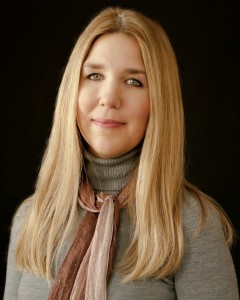
Evangelicals had always seemed like the "other" Christians. They were the ones who didn't celebrate Advent or baptize babies. They were the ones who went colleges that required pledges not to drink, smoke or dance. They were the ones who frowned upon evolution or "free-thinking."
As a child of the 1970s and '80s, I saw evangelicals as politically and socially conservative -- ever skeptical of culture and worried about what we were reading and watching. They bobbed for apples at "Harvest" parties instead of trick-or-treating on Halloween. They were the ones telling Kevin Bacon he couldn't be footloose and fancy free -- or maybe those were "fundamentalists." Did it matter? Was there even a difference?
Do Evangelicals hate smart people?
No. But it is such a persistent rumor that it might take something as momentous as another Protestant Reformation to see it die.
Why?
Because there are folks out there that do hate smart people. More precisely, there are people of faith who draw a line between "God's Word" and "Man's Opinion." They set up human reason as a force fighting against God's truth. While I think most Christians would agree that human reason is imperfect and limited (as humanists and scientists would probably agree as well) that doesn't make it antithetical to "God's Word." Most Christian traditions acknowledge reason as a gift from God not an enemy of God.
Occupy America: A new great awakening. Election-year goals of Christian group questioned. Would you pledge $20.14 to end the war in Afghanistan? Religion And Immigration: We Have Not Yet Begun To Love.
Editor's Note: HuffPost Religion is running a series of posts by Sojourners' Director of Mobilizing Lisa Sharon Harper and D.C. Innes, her co-author on the new book, Left, Right and Christ: Evangelical Faith in Politics, about how Christians should view social issues. Their first issue is Occupy Wall Street.
"There's one thing for sure: 'Evangelical' has become a misrepresented, overly-defined, politicized, theologically kidnapped term. It seems to barely recognize its own creator. What ever happened to true evangelicalism? Whatever happened to that hope of freedom restored?"
